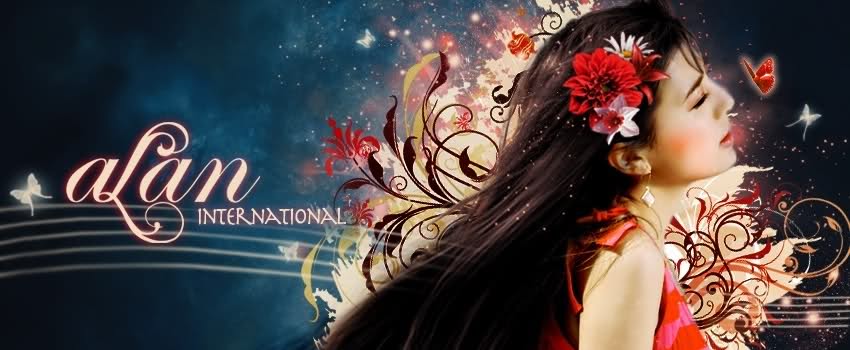Her miraculous voice crossed borders
Asia’s new singer talks about “love and peace”
ALAN
---When did you first start to aspire to become an artist?
“My mother is an Tibetan folk singer. I’ve grown up surrounded by music, which influenced me a lot. A friend of my mother taught me to play the erhu when I was eight. I entered the PLA Art Academy in Beijing when I was sixteen and I received vocal lessons there. That’s when I first started to realize I wanted to become an artist.”
---What kind of child were you?
“I was raised in the Beauty Valley in China, located 3,000 meters above sea level and surrounded by 5,000 meters high mountains. It’s a place filled with nature. I was a tomboy, running and playing outside. I also climbed the mountains... which is quite dangerous now that I think about it (laughs).”
---Were you interested in Japan?
“I love Japanese anime. I watched Doraemon and Slum Dunk. But I never imagined that I would actually go to Japan. I couldn’t speak Japanese either, of course. But I decided to enter avex’s China auditions and planned to sing a Japanese song. That’s when I first came into close contact with Japanese. Because I started from zero, I first listened to the melody and rewrote the lyrics into Chinese. I wrote the lyrics’ pronunciation onto the music score and tried to memorize it. After that, I came to Japan in April 2007 and quickly debuted.”
---What’s the trick to singing in Japanese?
“Words with deep meaning like ‘yuubae’ and ‘jiga’ are often used in my songs’ lyrics. There are still words that I don’t know, so I first have someone explain the meaning to me. Afterwards, I try to grasp the image of the song. I constantly think about how I can be moved. If I can’t be moved by the song, I can’t give shape to the image of the song and the listeners won’t be moved either.”
---Have you gotten accustomed to life in Japan?
“This year will be my 4th year. I was very anxious when I first arrived. I was separated from my friends and family. I worried whether the Japanese public would like my songs. But my staff members were very kind and supportive, which helped me relax. Now it’s much easier because I have fans now and I can communicate with them through twitter and blogs.”
---Lately you’ve been working as a model, as well.
“I’m featured on the ‘fashion and beauty’ pages. Sometimes photo-shoots take all day, which is tough, but I love modelling. I love doing new things.”
---Are there things you want to try doing aside from activities in entertainment?
“If I had to do something completely different, it’d like to work in a restaurant with Chinese cuisine. Italian and French cuisine are nice too, but the menu would be hard to read, so I’ll stick with Chinese (laughs).”
There are also tough times, but my fans save me
---What places do you often visit?
“I often go shopping in Harajuku. I also love Odaiba’s night scenery. I’ve gone several places for work. Aside from Tokyo I also love Kyoto. The autumn colours were beautiful and impressed me.”
---What kind of things do you do in the rural areas?
“I often go perform for tours and events. Recently I visited a university in Fukuoka and talked with Chinese and Taiwanese exchange students. Everyone struck up friendly conversations with me. They talked about various things, like about how difficult first coming to Japan is and about part-time jobs, etc. My schedule is packed, so I don’t have much free time, but when I have a break, I do things like shopping or visiting aquariums. Of course, I look forward to eating tasty food afterwards!”
---Last year you held your first solo tour.
“I went to Tokyo, Osaka and Nagoya. I still get nervous on stage but having the hall filled with fans soothed me. I also worked hard on the MC. “Thank you for coming” “Thank you for always supporting me” – I wanted to put across my gratitude.”
---Please tell us about your new song ‘ikiru’ which will go on sale 29 June.
“Matsumoto Takashi-san, who has written for various artists, wrote the lyrics, which is a true honour. Japan is facing a difficult time. Many have lost their family and houses because of the earthquake, and are deeply sad. But, I believe that the courage to take a step forward is also important. Wanting to help everyone, I made a soft ballad to encourage people. During the Sichuan Earthquake (May, 2008), the Japanese people supported and helped me. This time it’s my turn. I want to return the favour with my music.”
I want to move people’s hearts with my music
---What do you want to put across with your music?
“My theme is ‘love and peace’. This hasn’t changed since my debut. I’d be happy if I could move people’s hearts with my music. Also, ‘courage and faith’. It’s important to give everyone courage and faith. Debuting as a singer after coming to Japan without any friends, was like starting from zero. It’s my faith to continue to make music to share these themes.”
---What kind of artist do you aspire to be in the future?
“I want to learn to write lyrics, compose and arrange so I can give shape to the things I imagine. I also want to challenge producing. I’ve already arranged parts with the Tibetan wail in it by myself, but I want to broaden my range of expression.”




